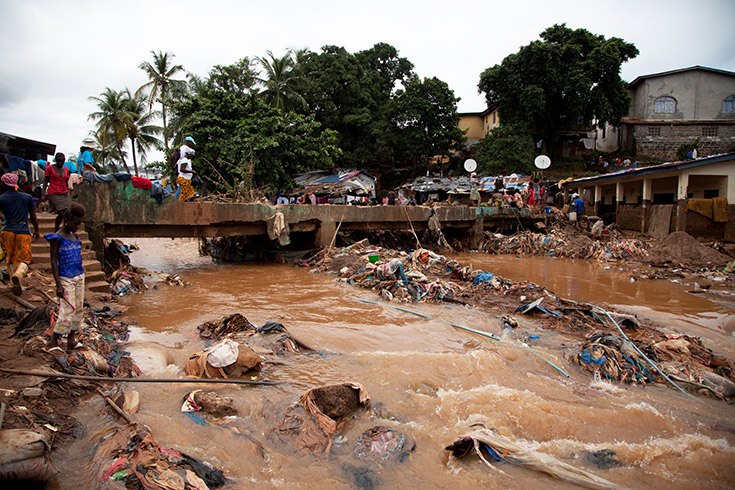Disaster management training in Sierra Leone
Editorial Advisory Panel Member Robert McAlister starts a short series of blogs from Sierra Leone, where he is delivering training to the country’s Office of National Security.

UNICEF staff on their way to visit Kroo Bay Community Primary School (right) in Freetown following the floods that devastated some of the most vulnerable communities in Freetown in September 2015. UNICEF is assessing the conditions of schools affected by the floods and will be supporting the Government of Sierra Leone to ensure students in affected schools will be able to return to their lessons (photo: UNICEF / Indrias Getachew Kassaye)
I arrive in Freetown - Sierra Leone, at an interesting but challenging time. I am here this month with the Director of Bournemouth University Disaster Management Centre to deliver the first of a series of Disaster Management Training sessions to the Sierra Leone Office of National Security against a backdrop of the decreasing Ebola crisis, and a current new threat that may hamper timescales regarding the virus’s final eradication.
It has been an exceptionally difficult few weeks for the people and disaster management agencies in Freetown. After getting new reported Ebola cases down to virtually zero, torrential rains have devastated Freetown and surrounding areas. Last week 145mm of water fell within five hours creating rivers of fast moving water, washing away people, houses and damaging vital infrastructure in its path.
With an estimated 18,000 people displaced within the Western District of Freetown, the National Football Stadium and the Brima Attouga Mini Stadium are being used to accommodate thousands.
The conditions are not ideal owing to close group proximity and limited hygiene facilities and authorities are rightly worried about increased Ebola cases and the threat of cholera. The Ministry of Health has put in place monitoring regimes to watch this closely. A further 5,000 people have had their villages washed away in the outer districts.
The government here is fully committed to tackling this latest crisis, but has been criticised in the media for the poor disaster response and lack of public warning and informing alerts before the floods.
Deforestation (this affects soil conditions), climate change and the lack of implemented land use policies, along with legislation allowing houses to be built in unsuitable flood risk areas have also been blamed for increasing the impact of the predicted annual flooding during the current rainy season. This is already one of (if not the) wettest places on earth, raining for six months of the year, but these floods have been unprecedented and stretched recovery agencies to the maximum.
Only days ago the drive from the airport ferry would have been impossible, owing to main road closures as a result of the sheer volume of water and debris it left behind. These roads are slowly coming back into operation although minor roads are still affected, creating logistical issues for the community and local businesses.
With the long-term impact of Ebola on international tourism and regional business (there are still very few commercial carriers flying into Sierra Leone), this current crisis can only exacerbate the economic situation for everyone here.
This is an amazing and beautiful country and its people certainly deserve a break after years of conflict, Ebola and the recent serious floods. Let’s hope light must be at the end of the tunnel. It certainly focuses my mind regarding the importance of our time and training here and the impact that learning will have on future threats they may face.
Training starts tomorrow with visits to the two Stadiums mentioned, NERC – National Ebola Response Centre and meetings with many senior attendees who have been directly engaged in the ongoing Ebola crisis and current flood events, so there will be a rich source of up to date examples to reflect upon, probe and learn from.
Robert McAlister, 28/09/2015